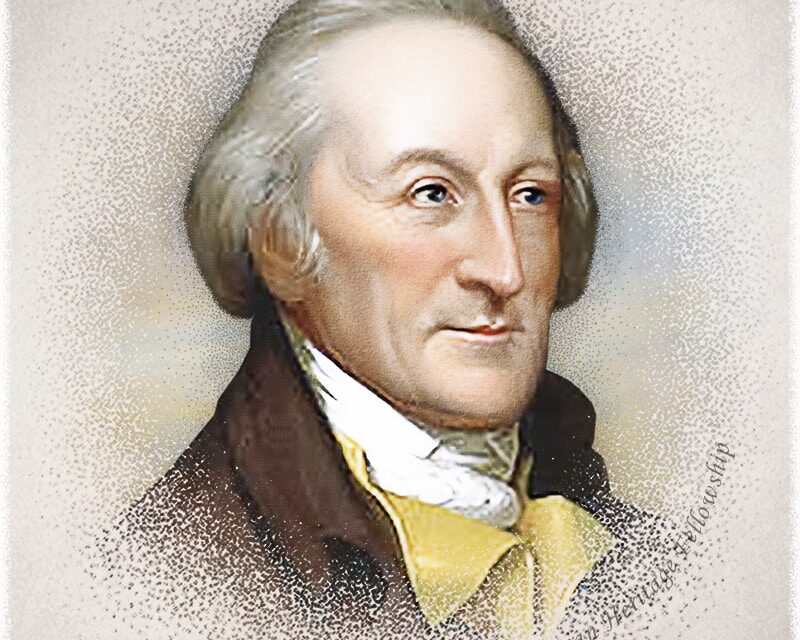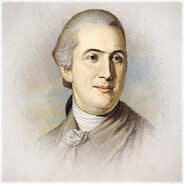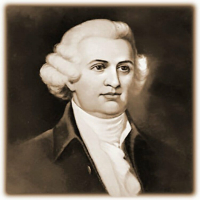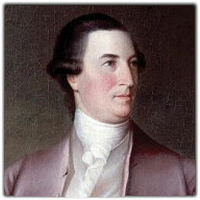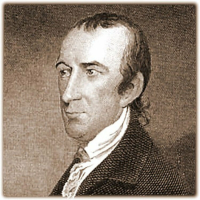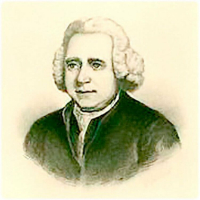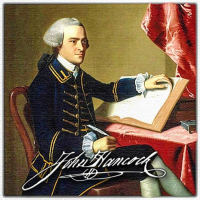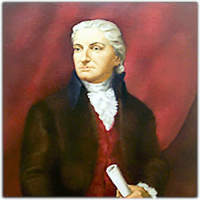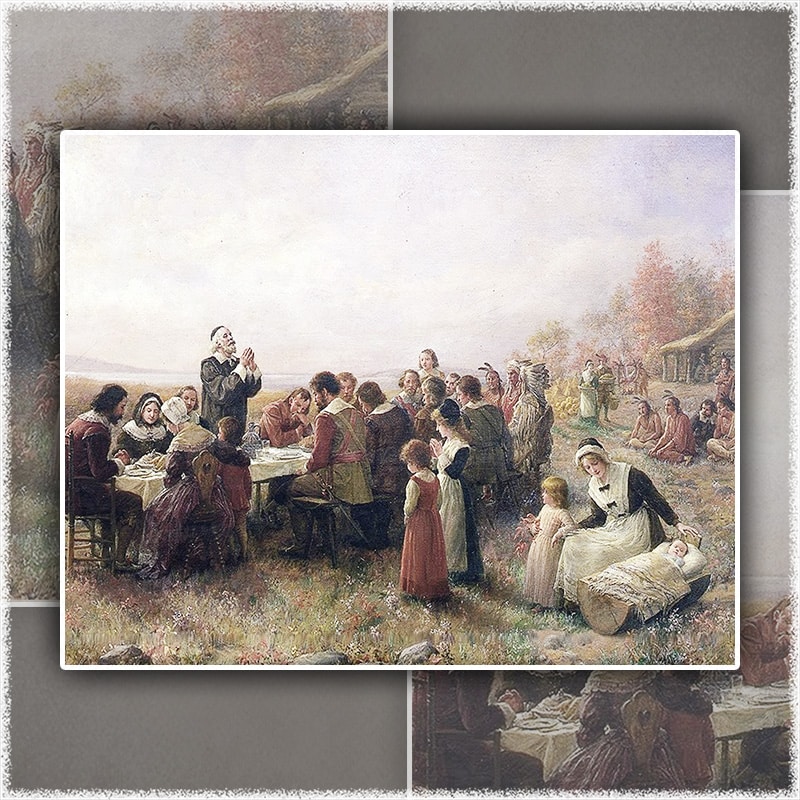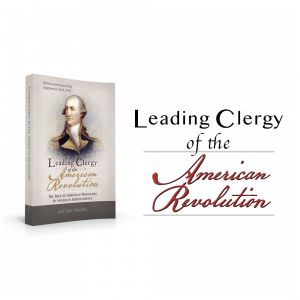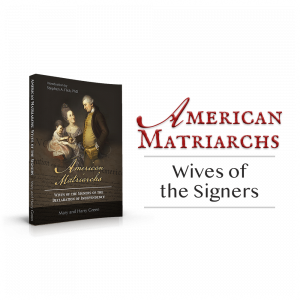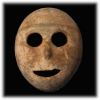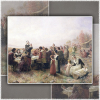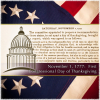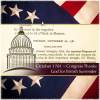George Clymer (March 16, 1739 – January 24, 1813) was an American politician and founding father. He was one of the last Patriots to advocate complete independence from Britain. As a Pennsylvania representative, Clymer was, along with five others, a signatory of both the Declaration of Independence and the U.S. Constitution. Points of significance include the following:George Clymer
Orphaned at seven, was raised by an uncle, and followed his uncle into mercantilism in Philadelphia, Pennsylvania;
Accepted a commission as captain over a company of volunteers during the Revolution;
Successfully chaired a committee opposing the sale of tea in Philadelphia;
In 1775, was chosen as a member of the council of Safety and one of the first continental treasurers;
July 20, 1776, was elected to the Continental Congress, though not present when the vote for independence was taken and was granted the privilege of affixing his name on the Declaration of Independence the following month;
The home in which he was living was attacked by British soldiers and many belongings destroyed;
Narrowly escaped an Indian attack when sent to Pittsburgh to enlist several Indian tribes in the American cause—particularly the Shawnee and Delaware Indians;
Assisted Robert Morris in the establishment of a bank in 1780 to assist the American cause of independence;
Moved his family to Princeton, New Jersey in 1782 for the purpose of educating his children there;
In 1784, he was elected to the Pennsylvania General Assembly, serving there until his election to the United States Congress, where he served one term—refusing re-election;
Helped to negotiate a treaty with the Cherokee and Creek Indians in Georgia in 1796, after which he retired from public service.
The brief biographical sketch of his life presented below is taken from the nineteenth-century work, Lives of the Signers of the Declaration of Independence by Rev.Charles Goodrich. George Clymer
Article Contents
A Thumbnail Biographical Sketch
George Clymer was born in the city of Philadelphia, in the year 1739. His father was descended from a respectable family of Bristol, in England; and after his emigration to America became connected by marriage with a lady in Philadelphia. Young Clymer was left an orphan at the age of seven years, upon which event the care of him devolved upon William Coleman, a maternal uncle, a gentleman of much respectability among the citizens of Philadelphia.
The education of young Clymer was superintended by his uncle, whom few men were better qualified for such a charge. The uncle possessed a cultivated mind, and early instilled into his nephew a love of reading. On the completion of his education, he entered the counting room of his uncle. His genius, however, was little adapted to mercantile employments, being more inclined to literary and scientific pursuits. At a suitable period he commenced business for himself, in connection with Mr. Robert Ritchie, and afterwards with two gentlemen, father and son, by the name of Meredith, a daughter of the former of whom he subsequently married.
Although Mr. Clymer embarked in the pursuits of commerce, and continued engaged in that business for many years, he was always decidedly opposed to it. During his mercantile operations, he found much time to read. He was distinguished for a clear and original mind; and though he never pursued any of the learned professions, he became well versed in the principles of law, history, and politics.
At the age of twenty-seven, he was married, as has already been noticed, to a daughter of Mr. Meredith, a gentleman of a generous and elevated mind, as the following anecdote of him will show. While yet a young man, General Washington had occasion to visit Philadelphia, where he was a complete stranger. Happening in at the public house where Washington lodged, Mr. Meredith observed him, inquired his name, and finding him to be a stranger in the place, invited him to the hospitalities of his house, and kindly insisted upon his continuance with his family while he remained in the city. This accidental acquaintance led to a friendship of many years continuance, and at Mr. Meredith's, Washington ever after made it his home when he visited Philadelphia.
Mr. Clymer may be said to have been by nature a republican. He was, also, a firm and devoted patriot. His feelings were strongly enlisted, at an early age, against the arbitrary acts of the British government. Gifted with a sort of prescience, he foresaw what was meditated against his country, and was ready to hazard every interest in support of the pillars of American freedom. Hence, when conciliatory measures with the parent country were found unavailing, he was one of the foremost to adopt measures necessary for defense. He early accepted a captain's commission in a company of volunteers, raised for the defense of the province, and manfully opposed, in 1773, the sale of tea, which was sent out by the British government for the purpose of indirectly levying a contribution on the Americans without their consent. Never was a plan more artfully laid by the ministry of Great Britain; never was an attack upon American liberty more covert and insidious; and never was a defeat more complete and mortifying. On the arrival of the tea destined to Philadelphia, the citizens of that place, in a numerous meeting, adopted the most spirited resolutions, the object of which was to prevent the sale of it. A committee was appointed, of which Mr. Clymer was chairman, to wait upon the consignees, and to request them not to attempt to sell it. This was a delicate office; the committee, however, fearlessly and faithfully discharged the duties of their appointment; and not a single pound of tea was offered for sale in the city of Philadelphia.
In 1775, Mr. Clymer was chosen a member of the council of safety, and one of the first continental treasurers. On the 20th of July, of the following year, he was elected a member of the Continental Congress; and though not present when the vote was taken on the question of independence, he had the honor of affixing his signature to that instrument in the following month.
In September, Mr. Clymer was appointed to visit Ticonderoga, in conjunction with Mr. Stockton, to inspect the affairs of the northern army. In December of the same year, congress, finding it necessary to adjourn to Baltimore, in consequence of the advance of the British army towards Philadelphia, left Mr. Clymer, Robert Morris, and George Walton, a committee to transact such business in that city as might be found necessary.
In 1777, Mr. Clymer was again a member of congress. His duties during this session were particularly arduous, and owing to his unremitting exertions, he was obliged to retire for a season, for the recovery of his health.
During the fall of this distressing year, the family of Mr. Clymer, which, at that time resided in the county of Chester about twenty-five miles from Philadelphia, suffered severely, in consequence of an attack by a band of British soldiers. The furniture of the house was destroyed, and a large stock of liquors shared a similar fate. Fortunately, the family made their escape. Mr. Clymer was then in Philadelphia. On the arrival of the British in that place, they sought out his residence, and were proceeding to tear it down, and were only diverted from their purpose by the information, that the house did not belong to him.
During this year, Mr. Clymer was appointed a commissioner, in conjunction with several other gentlemen, to proceed to Pittsburg, on the important and confidential service, of preserving a good understanding with several Indian tribes in that country, and particularly to enlist warriors from the Shawnee and Delaware Indians into the service of the United States. During his residence at Pittsburg, he narrowly escaped death from the tomahawk of the enemy, having, in an excursion to visit a friend, accidentally and fortunately taken a route that led him to avoid a party of savages, who murdered a white man at the very place where Mr. Clymer must have been, had he not chosen a different road.
In our biographical sketch of Robert Morris, we have given some account of the establishment of a bank by the patriotic citizens of Philadelphia, the object of which was the relief of the army, which, in 1780, was suffering such a combination of calamities, as was likely to lead to its disbanding. Of the advocates of this measure, Mr. Clymer was one, and from the active and efficient support that he gave to the bank, he was selected as a director of the institution. By means of this bank, the pressing wants of the army were relieved. Congress, by a resolve, testified the high sense which they entertained of the generosity and patriotism of the association, and pledged the faith of the United States to the subscribers to the bank for their ultimate reimbursement and indemnity.
Mr. Clymer was again elected to congress in 1780; from which time, for nearly two years, he was absent from his seat but a few weeks, so faithfully and indefatigably attentive was he to the public service. In the latter part of 1782, he removed with his family to Princeton, in New Jersey, for the purpose of giving to his children the advantages of a collegiate education, in the seminary in that place. After the many toils and privations through which he had passed, it was a luxury, indeed, to enjoy the peace of domestic life, especially having to reflect that the glorious object for which he and his fellow countrymen had labored so long, was now with certainty soon to be accomplished.
In 1784, Mr. Clymer was again summoned by the citizens of Pennsylvania to take a part in the general assembly of that state. Of this body he continued a member until the meeting of the convention to form a more efficient Constitution for the general government; of which latter body he was elected a member, and after the adoption of the constitution, he represented the state of Pennsylvania, in congress, for two years; when declining a re-election, he closed his long and able legislative career.
In the year 1791, congress passed a bill imposing a duty on spirits distilled in the United States. To the southern and western part of the country, this duty was singularly obnoxious. At the head of the excise department, in the state of Pennsylvania, Mr. Clymer was placed. The duties of this office were rendered extremely disagreeable, by reason of the general dissatisfaction, which prevailed on account of the law. This dissatisfaction was particularly strong in the district of Pennsylvania lying west of the Allegheny Mountains, and here the spirit of discontent broke out into acts of open opposition. At the risk of his life, Mr. Clymer made a visit to this theater of insurrection, to ascertain the existing state of things, and if possible to allay the spirit of opposition, which was manifesting itself. His instructions, however, were so limited, that he was able to produce but little effect upon the turbulent and heated minds of the faction. Soon after his return, he was induced to resign an office, which, from the difficulty of faithfully discharging it, had become extremely disagreeable to him.
In the year 1796, Mr. Clymer was appointed, together with Colonel Hawkins and Colonel Pickins to negotiate a treaty with the Cherokee and Creek Indians in Georgia. With this object in view, he sailed from Philadelphia for Savannah, in the month of April, accompanied by his wife. Their voyage proved not only exceedingly unpleasant, but extreme ly hazardous, in consequence of a violent storm, during which, the crew were for several days obliged to labor incessantly at the pumps. Having satisfactorily completed the business of his mission, he again returned to Philadelphia.
At this time, he closed his political life, and retired to the enjoyment of that rest which he justly coveted, after having served his country, with but few short intervals, for more than twenty years.
At a subsequent date, he was called to preside over the Philadelphia bank, and over the Academy of Fine Arts, and was elected a vice-president of the Philadelphia Agricultural Society, upon its re-organization, in 1805. These offices he held at the time of his death, which occurred on the 23d of January, 1813, in the 74th year of his age.
The following extracts from an eloquent eulogium, pronounced before the Academy of Fine Arts, upon the character of Mr. Clymer, by Joseph Hopkinson, Esq. may properly conclude this brief biographical notice. After alluding to the election of Mr. Clymer to the presidency of the Academy of Fine Arts, Mr. Hopkinson happily observes:
At different periods of our national history, from the first bold step which was taken in the march of independence, to its full and perfect consummation in the establishment of a wise and effective system of government, whenever the virtue and talents of our country were put in requisition, Mr. Clymer was found with the selected few, to whom our rights and destinies were committed.
When posterity shall ponder on the declaration of July 1776, and admire, with deep amazement and veneration, the courage and patriotism, the virtue and self-devotion of the deed, they will find the name of Clymer there. When the strength and splendor of this empire shall hereafter be displayed in the fullness of maturity, (heaven grant we reach it) and the future politician shall look at that scheme of government, by which the whole resources of a nation have been thus brought into action; by which power has been maintained, and liberty not overthrown; by which the people have been governed and directed, but not enslaved or oppressed; they will find that Clymer was one of the fathers of the country, from whose wisdom and experience the system emanated. Nor, was the confidence, which had grown out of his political life and services, his only claim to the station that he held in this institution. Although his modest, unassuming spirit never sought public displays of his merit, but rather withdrew him from the praise, that was his due; yet he could not conceal from his friends, nor his friends from the world, the extraordinary improvement of his mind. Retired, studious, contemplative, he was ever adding something to his knowledge, and endeavoring to make that knowledge useful. His predominant passion was to promote every scheme for the improvement of his country, whether in science, agriculture, polite education, the useful or the fine arts. Accordingly, we find his name in every association for these purposes; and wherever we find him, we also find his usefulness. Possessed of all that sensibility and delicacy, essential to taste, he had of course a peculiar fondness for the fine arts, elegant literature, and the refined pursuits of a cultivated genius. It was in the social circle of friendship that his acquirements were displayed and appreciated, and although their action was communicated from this circle to a wider sphere, it was with an enfeebled force. His intellects were strong by nature, and made more so by culture and study; but he was diffident and retired. Capable of teaching, he seemed only anxious to learn. Firm, but not obstinate; independent, but not arrogant; communicative, but not obtrusive, he was at once the amiable and instructive companion. His researches had been various, and, if not always profound, they were competent to his purposes, and beyond his pretensions. Science, literature, and the arts, had all a share of his attention, and it was only by a frequent relationship with him, we discovered how much he knew of each. The members of this board have all witnessed the kindness and urbanity of his manners. Sufficiently fixed in his own opinions, he gave a liberal toleration to others, assuming no offensive or unreasonable control over the conduct of those with whom he was associated.
In a subsequent part of his discourse, Mr. Hopkinson, alluding to the value of a punctual performance of our promises, remarks:
In this most useful virtue, Mr. Clymer was preeminent. During the seven years he held the presidency of this academy, his attention to the duties of the station were without remission. He excused himself from nothing that belonged to his office; he neglected nothing. He never once omitted to attend a meeting of the directors, unless prevented by sickness or absence from the city; and these exceptions were of very rare occurrence. He was indeed the first to come; so that the board never waited a moment for their president. With other public bodies to which he was attached, I understand, he observed the same punctual and conscientious discharge of his duty. It is thus that men make themselves useful, and evince that they do not occupy places of this kind merely as empty and undeserved compliments, but for the purpose of rendering all the services that the place requires of them.[1]
America deserves to know its true heritage.
Please contribute today!
"Anchor Elements" are concepts, events, individuals, terms, or other important components that are featured in this article and which act as authoritative reference points for use in other articles throughout our site.
George Clymer
[1] Orthography slightly updated. Rev.Charles A. Goodrich, Lives of the Signers to the Declaration of Independence, 5th ed. (New York: Thomas Mather, 1836), 284-291.

